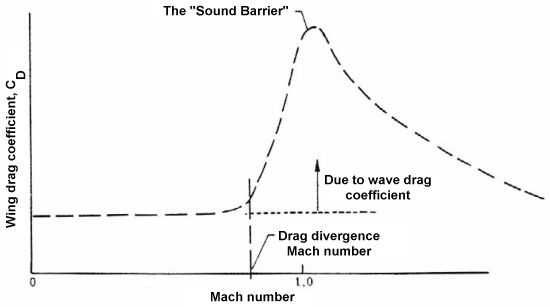|
||||||||||
|
|
||||||||||
|
||||||||||
|
|
||||||||||

The term sound barrier is actually a misnomer that is technically inaccurate. The phrase was originally coined during the 1930s as fluid dynamics research pushed closer and closer to the speed of sound. It was soon discovered that the aerodynamic force of drag grew increasingly large when approaching Mach 1, a phenomenon we now recognize as the transonic drag rise caused by the formation of shock waves.

This behavior led many to believe that there was some sort of physical barrier that would prevent an object from reaching supersonic speeds. However, this belief turned out to be incorrect, and supersonic vehicles are commonplace today. We know today that there is no "sound barrier," and the antiquated term ought to be discontinued. Regardless, the phrase has taken on a life of its own and is still widely used by the general public, though you'll rarely find any aerospace engineers who do so.
With respect to your comments, I believe you misunderstand the intent of what the statement about "human speech" attempts to convey. It does not imply that there is only one language, but rather that humans around the world still use the term "sound barrier" no matter what language they speak. So prevalent is the phrase that many dictionaries providing translations from English to other languages even include a direct translation of the term "sound barrier." Most of these forms are a literal translation of the words "sound" and "barrier," though some languages use slightly modified terminology like "sound wall" or "sonic barrier." The following table lists a sample of the equivalents we have found in a variety of languages.
| English: | sound barrier | German: | die Schallmauer | Dutch: | geluidsbarrière |
|---|---|---|---|---|---|
| French: | le mur du son | Spanish: | la barrera del sonido | Italian: | il muro del suono |
| Portuguese: | barreira do som | Greek: | |
|
|
| Danish: | lydmur | Swedish: | ljudvall | Finnish: | äänivalli |
| Polish: | bariera dzwieku | Czech: | zvuková bariéra | Slovak: | zvuk bariéra |
| Hungarian: | hanghatár | Serbian: | zvucna granica | Croatian: | zvuèni zid |
| Russian: | |
Bulgarian: | |
Ukrainian: | |
| Arabic: | |
Persian: | |
Turkish: | ses duvarý |
| Indonesian: | suara rintangan | Urdu: | awaz rukaawat | Afrikaans | Klankgrens |
(Please contact us with any corrections or additions to this list.)
The phrase "sound barrier" has become a universally recognized part of speech in most, if not all, of the world's major languages. The fact that it is a technically incorrect description of supersonic flight appears to make little difference, and the popularity of the term "sound barrier" shows no signs of diminishing.
Furthermore, it is worth noting that although English is not by any means the official language of most nations,
it is the official language of the international air traffic control system. All pilots and air traffic
controllers are required to converse in English on international routes, and many countries also require English to
be spoken on domestic routes even if it is not the native language.
- answer by Greg Alexander, 12 December 2004
Read More Articles:


|
Aircraft | Design | Ask Us | Shop | Search |

|
|
| About Us | Contact Us | Copyright © 1997-2023 | |||
|
|
|||